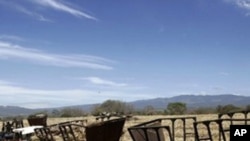The United States is deeply committed to ensuring that food is available, affordable and nutritious. Together with international partners, the United States has launched an unprecedented effort over the past three years to reverse a decades-long decline in agricultural investments. Our goal is to alleviate the chronic hunger that afflicts nearly one billion people around the world, including an estimated 53 million in Latin America and the Caribbean.
In July 2009, at the G-8 Summit in L’Aquila, Italy, global leaders, including President Barack Obama, called for increased investment in agriculture, nutrition and rural development in developing countries as a proven lever for combating food insecurity and as an engine for broad-based economic growth, prosperity and stability. This commitment laid the foundation for “Feed the Future,” the U.S. government’s global hunger and food security initiative.
In the Americas, Feed the Future invests in rural areas of three focus countries: Guatemala, Honduras and Haiti. Over five years, investments and programs involving the entire agricultural value chain from seeds to farms to markets will assist 1 million vulnerable women, children and family members, mostly smallholder farmers, to escape hunger and poverty in these countries.
This commitment to food security is vital in the Americas, said Ambassador Carmen Lomellin, U.S. Permanent Representative to the Organization of American States. “The stark fact remains,” she said, “that the levels of food security in our hemisphere still do not match our natural abundance.”
By working together, the United States believes OAS members can contribute collectively to food security at both the hemispheric and global levels. To achieve that goal, OAS members must safeguard the political and economic progress that has been made to date. That’s why it is important to support the democratic underpinnings of the countries in the region, including good governance, responsive institutions, respect for human rights and fundamental freedoms.
As U.S. Secretary of State Hillary Rodham Clinton has said, “We must turn the Americas, already a community of shared history, geography, culture, and values, into something greater, a shared platform for global success.” It is critical for OAS member countries to continue to join efforts to improve food security in the Americas.
Our goal is to alleviate the chronic hunger that afflicts nearly one billion people around the world, including an estimated 53 million in Latin America and the Caribbean.













